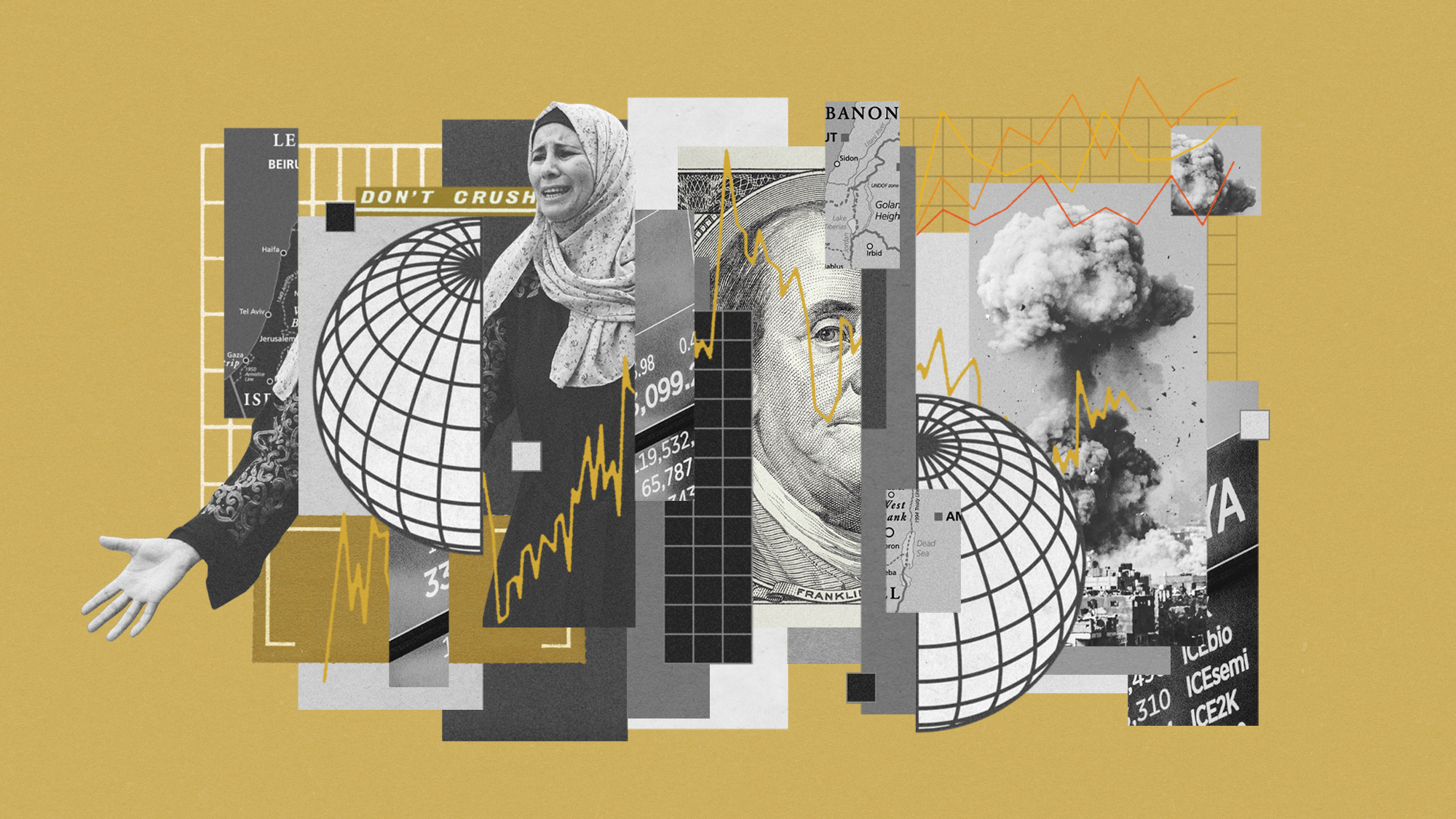How might the Israel-Hamas war affect the global economy?
Regional escalation could send oil prices and inflation sky-high, sparking a worldwide recession

A free daily email with the biggest news stories of the day – and the best features from TheWeek.com
You are now subscribed
Your newsletter sign-up was successful
The war between Israel and Hamas could deal a "serious" blow to global economic development, the president of the World Bank has warned.
Speaking at an investor conference in Saudi Arabia, Ajay Banga said the world economy was now at "a very dangerous juncture" as tensions continue to rise in the region amid fears the conflict could escalate into a regional war – or worse.
Over the past half century, it is "difficult to think of a time when so many dangers from so many directions could each spiral out of control so quickly as is now occurring in the Middle East", said Oil Price.
The Week
Escape your echo chamber. Get the facts behind the news, plus analysis from multiple perspectives.

Sign up for The Week's Free Newsletters
From our morning news briefing to a weekly Good News Newsletter, get the best of The Week delivered directly to your inbox.
From our morning news briefing to a weekly Good News Newsletter, get the best of The Week delivered directly to your inbox.
What did the papers say?
"Warning bells went off in financial markets the instant the extent of the deadly Hamas attack on Israel became apparent," said The Guardian's economics editor Larry Elliott – "and it is easy to see why".
One of the "rules of thumb of geopolitics", he wrote, "is that recessions are sparked by a sharp jump in oil prices, and the cost of crude is sensitive to events in the Middle East".
You only need to look at what happened 50 years ago – when the surprise attacks on Israel by Egypt and Syria started the Yom Kippur War and Israel's subsequent counteroffensive sparked an oil crisis that led to a global downturn – to see the devastating economic implications of a localised war in the Middle East. The world may be less dependent on oil than it was in 1973 but it still matters.
The current conflict has already impacted forecasts for the Israeli economy, said the Financial Times, and saw the price of Brent crude rise beyond $90 a barrel, the gas market reach an eight-month high, and financial markets around the world fall sharply.
A free daily email with the biggest news stories of the day – and the best features from TheWeek.com
It has had a "similar – but so far much less pronounced – effect" on energy markets to Russia’s invasion of Ukraine last year, said The New Statesman. This caused the price of oil to rise immediately to more than $100 a barrel and wholesale gas prices to peak at 10 times their typical levels, sparking rampant inflation, higher interest rates and a cost-of-living crisis.
"There's only so many conflicts you can cope with, in global supply chains, when these conflicts are in areas of significance for raw material supply, like oil and gas," said Henning Gloystein, director of energy, climate and resources at the political risk consultancy Eurasia Group. He added that the 2022 energy crisis cost Europe and the UK in the region of a trillion dollars. "It doesn't take much to get back to where we were a year ago."
What next?
The risk the Israel-Hamas conflict could tip the world economy into recession is "real", said Bloomberg, but depends on whether hostilities remain largely confined to Gaza, spill into neighbouring Lebanon and Syria or – a worst-case scenario – draw in Iran. In all these cases, the "direction is the same – more expensive oil, higher inflation, and slower growth – but the magnitude is different", said the financial news service. "The wider the conflict spreads, the more its impact becomes global rather than regional."
Taken "alongside the realignment of various global alliances", the effect of the conflict on global financial markets will depend on the involvement of other regional powers, agreed Daniele Bianchi, professor of finance at Queen Mary University of London, on The Conversation. If it spreads to major oil-producing nations such as Iran, analysts warn oil prices could reach as high as $150 a barrel, sending inflation back into double digits in the US and Europe. If this leads to a "higher for longer" monetary policy that keeps interest rates elevated, "it would push up the cost of borrowing and refinancing by governments, companies and people", Bianchi said.
Were this to happen, much would depend on Saudi Arabia, the world's biggest oil exporter, and emergency gas supplies from Qatar, which "appear likely to continue under most circumstances" and would "alleviate some short-term price pain in the West", said Oil Price.
Then, said Elliott in The Guardian, "there is the doomsday scenario – sketched out by the historian Niall Ferguson – in which China takes advantage of the crisis" to move against Taiwan, and "escalates a regional conflict in the Middle East into a third world war.
"Even if fought by conventional methods," continued Elliott, "a military conflict between the world's two biggest economies would lead to a severing of global supply chains, a blow to confidence and crashing asset prices." The economic consequences would be "catastrophic", he concluded, "up to and including a second Great Depression".
Elliott Goat is a freelance writer at The Week Digital. A winner of The Independent's Wyn Harness Award, he has been a journalist for over a decade with a focus on human rights, disinformation and elections. He is co-founder and director of Brussels-based investigative NGO Unhack Democracy, which works to support electoral integrity across Europe. A Winston Churchill Memorial Trust Fellow focusing on unions and the Future of Work, Elliott is a founding member of the RSA's Good Work Guild and a contributor to the International State Crime Initiative, an interdisciplinary forum for research, reportage and training on state violence and corruption.
-
 What to know before filing your own taxes for the first time
What to know before filing your own taxes for the first timethe explainer Tackle this financial milestone with confidence
-
 The biggest box office flops of the 21st century
The biggest box office flops of the 21st centuryin depth Unnecessary remakes and turgid, expensive CGI-fests highlight this list of these most notorious box-office losers
-
 What are the best investments for beginners?
What are the best investments for beginners?The Explainer Stocks and ETFs and bonds, oh my
-
 Is the US in a hiring recession?
Is the US in a hiring recession?Today's Big Question The economy is growing. Job openings are not.
-
 Trump wants a weaker dollar, but economists aren’t so sure
Trump wants a weaker dollar, but economists aren’t so sureTalking Points A weaker dollar can make imports more expensive but also boost gold
-
 Tariffs have American whiskey distillers on the rocks
Tariffs have American whiskey distillers on the rocksIn the Spotlight Jim Beam is the latest brand to feel the pain
-
 The longevity economy booms as people live longer
The longevity economy booms as people live longerThe Explainer The sector is projected to reach $27 trillion by 2030
-
 How will China’s $1 trillion trade surplus change the world economy?
How will China’s $1 trillion trade surplus change the world economy?Today’s Big Question Europe may impose its own tariffs
-
 Texas is trying to become America’s next financial hub
Texas is trying to become America’s next financial hubIn the Spotlight The Lone Star State could soon have three major stock exchanges
-
 Employees are branching out rather than moving up with career minimalism
Employees are branching out rather than moving up with career minimalismThe explainer From career ladder to lily pad
-
 Who will be the next Fed chair?
Who will be the next Fed chair?Today's Big Question Kevin Hassett appears to be Trump’s pick